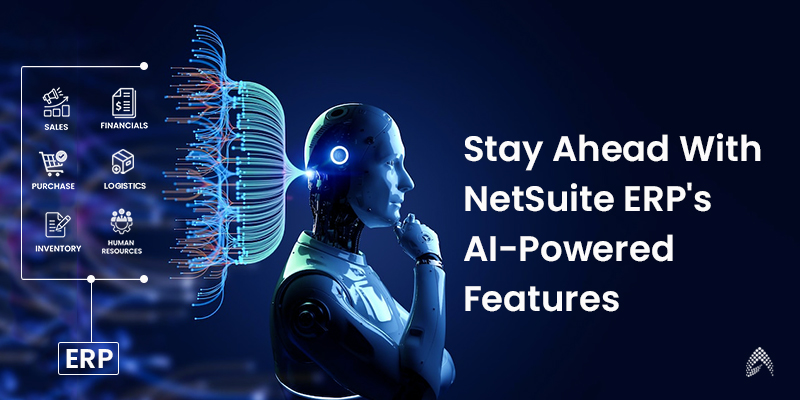How Is NetSuite Transforming Its ERP Suite With AI

AI is rapidly becoming a universal force in our world, significantly impacting various industries and reshaping the technological landscape. Particularly in the tech and IT sectors, it is revolutionizing the way things work, from self-driving vehicles and voice-activated personal assistants to complex algorithms that are used for recommendations and fraud detection, among others.
Furthermore, even within the domain of cloud-based Enterprise Resource Planning (ERP), AI is increasingly taking over. As per a 2021 report by Gartner, AI-driven functionalities within cloud ERP systems are expected to grow at an impressive rate, offering organizations enhanced automation, predictive analytics, and real-time insights. Hence, improving operational efficiency and informed decision-making. Another study conducted by Forbes highlighted that AI is projected to be a central component of nearly 95% of all customer interactions by 2025, reinforcing its impact not only on technology but also on the way businesses interact with their customers.
NetSuite has recently announced incorporating AI capabilities, specifically Generative AI, into its entire ERP suite at SuiteWorld 2023, which took place in Las Vegas, USA. With this, they are looking to empower users to drive better efficiency and business outcomes. Additionally, they are also looking to roll out AI Assist and AI Advise in various other functions.
In this blog, we will explore what Generative AI, AI Assist and AI Advise are and how the NetSuite ERP suite is embracing these AI capabilities to help its users gain a competitive edge.
What are Generative AI, AI Assist and AI Advise?
Generative AI
Generative AI, a subset of artificial intelligence, is revolutionizing the way machines can create content autonomously, mirroring human creativity. It does this by learning the patterns and structures of existing data and then using that knowledge to generate new content that is similar, but not identical, to the original. For example, a text-generating AI model might be trained on a dataset of books, articles, and other written materials. Once the model is trained, it can be used to generate new text, such as poems, code, or even entire novels.
The potential applications of generative AI are vast, spanning from content creation, language translation, and chatbots to medical research, where it can assist in generating drug compounds or simulating biological processes. Generative AI is still a relatively new field, but it has already made significant progress. The global generative AI market is expected to grow from $1.4 billion in 2021 to $19.6 billion by 2028. When it comes to the cloud ERP market, Generative AI holds immense potential by introducing a new level of efficiency and innovation. It has the ability to autonomously create content, such as reports, documentation, and even customized communication, reducing manual efforts and saving time within the ERP systems.
AI Assist
AI Assist refers to the ability of AI systems to support and enhance human activities by automating tasks, providing suggestions, or assisting with decision-making. AI assistants, such as chatbots or virtual assistants, are common examples. They can perform tasks like setting reminders, answering questions, or providing recommendations based on user input or individual needs.
AI Assist systems utilize machine learning algorithms to understand user actions, identify patterns, and offer proactive suggestions or automated actions, ultimately enhancing productivity and reducing errors. In the context of cloud ERP, AI Assist can help users navigate the system more efficiently by providing real-time, intelligent support to streamline complex ERP processes. For instance, it can automate data entry for financial transactions, significantly improving operational efficiency and data accuracy, or provide real-time recommendations and identify potential errors.
AI Advise
AI Advise involves the use of AI to offer recommendations or guidance to individuals, businesses, or organizations. AI systems can analyze data and patterns to offer advice or insights that can inform better decision-making. For example, in the financial industry, AI might offer investment advice based on market trends, or in healthcare, AI can suggest treatment options based on a patient’s medical history and symptoms. AI Advise helps users make more informed and data-driven decisions.
In the cloud ERP space, it acts as a digital advisor, aiding organizations in making informed decisions and optimizing their ERP systems. AI Advise systems analyze vast amounts of data, assess historical performance, and consider industry best practices to deliver actionable insights. It helps organizations make strategic decisions such as choosing the right ERP modules, optimizing workflows, and enhancing overall system performance. For example, AI Advise can recommend the most cost-effective ERP configuration for a specific business, predict market trends, identify opportunities for process improvement, or even suggest compliance measures to ensure regulatory adherence. This assists organizations in harnessing the full potential of their cloud ERP systems and achieving better business outcomes.
How is NetSuite leveraging these AI capabilities?
NetSuite is a leading provider of cloud-based Enterprise Resource Planning (ERP) solutions and is at the forefront of enabling AI-powered enhancements in their offerings and solutions. The ERP industry leader just confirmed the inclusion of Generative AI into its ERP suite. This is a significant stride into GenAI and follows several years of dedicated development aimed at integrating AI into NetSuite’s products and services. We can also look forward to AI Assist and AI Advise being a part of various solutions and functions in the near future.
SuiteWorld 2023
In the recently concluded SuiteWorld 2023, an annual event gathering NetSuite’s customers, developers, and partners to showcase new offerings, NetSuite has come out and announced that they are incorporating Generative AI into their entire ERP suite to stay ahead of the curve in the market. With this, they aim to empower solution providers and end-users to achieve cost reductions and gather deeper insights from their data without compromising privacy or security.
The first feature, a Generative AI tool named Text Enhance, was introduced, which empowers users to create contextual and personalized content, such as generating product documentation, tailored customer emails, report summaries, and other text-based documents, throughout NetSuite’s product portfolio. It is estimated to roll out over the next six months across the finance, HR, sales, and supply chain domains, among others.
Particularly in the finance department, the new features hope to automate everyday mundane tasks, enabling users to focus on strategic, business-critical responsibilities. NetSuite’s co-founder, Evan Goldberg, said that the feature would be able to automatically compose emails like collection letters with data from various parts of NetSuite’s systems, such as the amount owed, how many days the payment is past due, and a reminder that customers can get a discount in the future for paying sooner.
Additionally, they have also introduced AI-powered NetSuite Bill Capture, with which businesses would be able to capture and categorize expenses based on historical data, reducing the manual bill entry requirement.
NetSuite’s GenAI features are built on Oracle Cloud Infrastructure (OCI), which hosts both pre-built and customizable AI models, ensuring that customer enterprise data, privacy, and security remain intact. The GenAI features will initially be free, with no timeline given for when that will change. Moreover, customers will also be able to incorporate their own data securely, train particular models, and leverage immediate gains.
Other AI capabilities
Now that Generative AI has been the talk of the town, how about AI Assist and AI Advise, and how is NetSuite looking to leverage those?
In the NetSuite ERP system, AI Assist can assist users in automating tasks such as creating new orders, updating inventory levels, and responding to customer inquiries. This can free up employees to focus on more strategic tasks and help reduce errors while increasing accuracy and productivity. Whereas AI Assist will be able to provide personalized insights into business performance by identifying trends, patterns, and recommendations. This information can be used to make better business decisions, such as forecasting demand, optimizing inventory, and identifying new market opportunities. Both AI Assist and AI Advise can be used to personalize and enhance the NetSuite user experience largely.
Overall, NetSuite is well on the path to delivering AI capabilities that can help businesses of all sizes improve their efficiency, profitability, and competitiveness.
Conclusion
As advancements in AI continue, its role in technology and cloud ERP is an indication of its unstoppable rise in forming the world as we know it. Over time, we can expect to see even more innovative and useful applications for these technologies.
NetSuite, being a frontrunner and incorporating the capabilities of AI into their offerings, is hoping to deliver more intuitive and effective ERP solutions that cater to the evolving needs of modern businesses. This can help businesses get more value from their ERP systems and improve their business operations, profitability, and customer experience.
At Amzur, a leading NetSuite alliance partner, we ensure our clients achieve their desired results with our NetSuite implementation and consulting services. If you are interested in discovering more about how NetSuite is incorporating AI capabilities into their solutions and functions in order to optimize business operations and improve efficiency, you can talk to our NetSuite expert by clicking below.

Director – ERP Advisory & NetSuite Solutions




